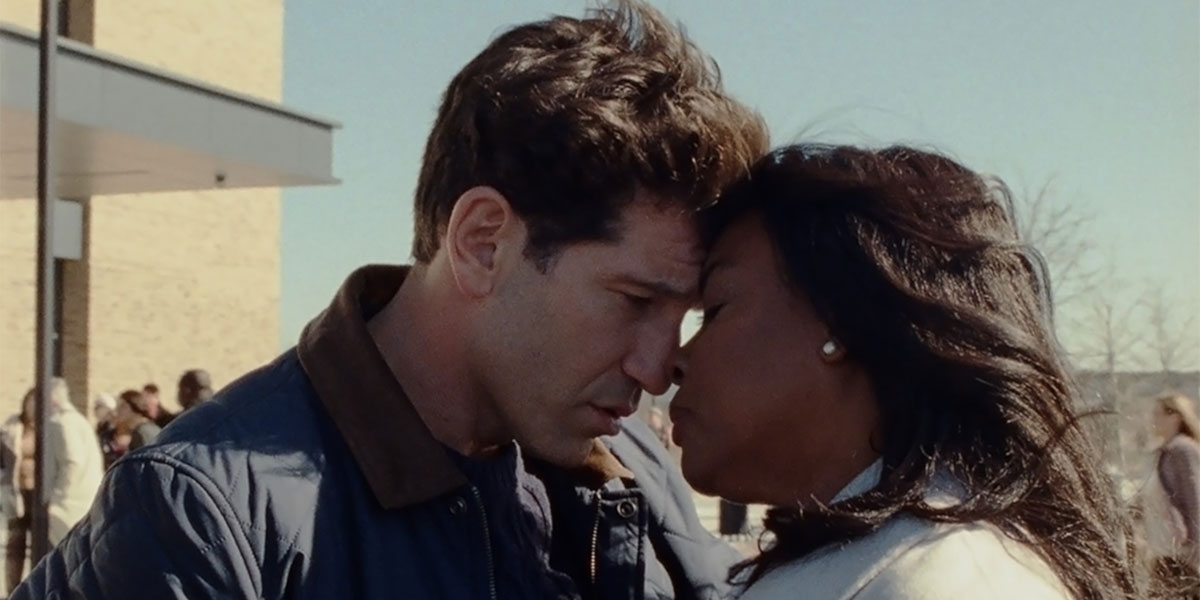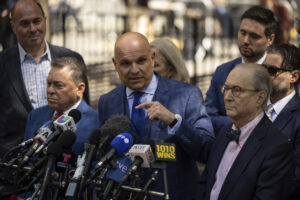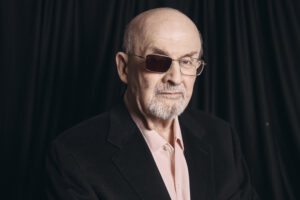‘Caste’: A Literary Origin Story
Ava DuVernay’s new film about Isabel Wilkerson is a nuanced political statement and a master class in Black cinema. Jon Bernthal and Aunjanue Ellis-Taylor in 'Origin.' Image courtesy of NEON.
Jon Bernthal and Aunjanue Ellis-Taylor in 'Origin.' Image courtesy of NEON.
In “Origin,” director Ava DuVernay tells the story of journalist Isabel Wilkerson’s personal and intellectual saga investigating the roots of American racism. Her protagonist (played by Anjanue Ellis-Taylor) is a fully fleshed-out Black woman of certain circumstances; already of some professional renown, she lives in a well-appointed suburban home and is comfortably middle class. But like all Black people, she remains bedeviled by the reality of race in 21st century America. She can barely listen to the recorded cries of Trayvon Martin that preceded his murder by George Zimmerman. She is further jarred and troubled by her mother’s insistence that the Florida teen could have saved himself if he’d done what white people expected of him — if he had fully followed the rules of caste. But, at some level, Wilkerson understands her mother is not wrong. Their shared but individual relationship with the past, and present, is one of many complexities in the film presented with DuVernay’s hallmark intimacy and resonance.
Wilkerson’s attempt to understand the nature of American racism led her on a globe-trotting quest through Germany and India to study the ways other countries have justified the subjugation, dehumanization and mass murder of entire classes of people. The result, published in 2020, was the bestselling nonfiction book “Caste,” celebrated for showing that American anti-Blackness and segregation are faces of a wider phenomenon that is global and timeless. By widening the context of the oppression in which “Blackness” was constructed, it disrupted and reconfigured a core American idea about its own exceptionalism.
Ellis-Taylor’s portrayal of Wilkerson throughout this journey is a wonder — subtle but dynamic and multilayered. As she researches and writes the book, the journalist takes care of her aging mother, reserves time for her husband and uses a favorite cousin as a sounding board for her germinating ideas. These intimacies are the film’s real epiphany. In making the day-to-day story of Wilkerson deeply felt but not sentimental, scrupulously observed but not voyeuristic, it illuminates its Black characters’ inner lives at every step without leaning on stereotypes. It doesn’t equate Blackness with crisis, humor or heroic resilience, although there are trace elements of all those things. In short, “Origin” redefines what a Black movie can be.
In making the day-to-day story of Wilkerson deeply felt but not sentimental, scrupulously observed but not voyeuristic, it illuminates its Black characters’ inner lives at every step without leaning on stereotypes.
Most remarkable is that there’s little action in the cinematic sense. Rather, “Origin” is a compilation of moments and their aftermaths. When Wilkerson’s husband dies suddenly, she lapses into inconsolable grief. It makes sense, but still feels odd to witness; one almost never sees Black people exhibit the kind of closeness and vulnerability on screen that “Origin” centers. It makes us part of her day-to-day and demands that we grieve, too. (I admit that I didn’t expect Wilkerson’s husband, who was white, to be portrayed as much more than a side note to the Black folk, including his wife; I was profoundly wrong.) DuVernay has said that she wants the audience to feel like they’re on Wilkerson’s research journey, but she also wants us to be in her skin, to know how much the journey matters. A point of view that has long been assumed as too narrow to hold anything other than itself is here presented as universal, essential. It feels revelatory.
“Origin” captures the extraordinary ordinariness of being Black, a journey of generations that is still under way. We’re all engaged in various ways for the search for the meaning of America that is the dramatic heart of the film. Race and the origins of caste are discussed not just with editors and literary agents, but with other Black people over coffee and picnic tables. The anxiety surrounding the questions of who we are, and why we are, is not the province of journalists, but of everyone. As it should be. Especially now, when the country seems poised to yield again to caste-ism. The argument that we as a country have been here before, that we’ve never not been here, aligns with one of Wilkerson’s chief findings: that caste systems are inflexible by design and not easily broken. But while our hierarchical tendencies may be all of a piece, different iterations all over the globe, this moment, in this place, is unique. In 2024, tens of millions of MAGA-fied Americans are openly refuting centuries of struggle that culminated in the Civil Rights Movement, a monumental though incomplete affirmation of egalitarian principles.
DuVernay told The New Yorker that she wanted to get the film out well ahead of this year’s election as a kind of preemptive counteroffensive. Her sense of urgency speaks to a growing fear in the country that the window to turn the tide away from caste-ism and back toward egalitarianism is closing, that the MAGA movement could hijack America for another generation, if not for good. Joe Biden said as much in his speech in South Carolina last week, where he commemorated the slaughter of nine Black people by a young white supremacist at a Charleston church in 2015. In his speech, Biden named discrete groups — extremist MAGA Republicans, white supremacists and other organized hate groups — but it’s clear he is talking about the culture of caste. His campaign message of democracy being on the ballot is not a reelection strategy so much as an acknowledgement that the effort to maintain the color lines of the power has put everything on the line. It’s up to the country — not him, not Trump — to decide if that’s what it truly wants. As Wilkerson said in the conclusion of “Caste,” it’s people who perpetuate systems and people who can dismantle them, or at least erode their power enough to allow something else to take their place. In DuVernay’s words, “Until we are able to actually shift systems, our dreams can only go so far.” The hope, and the damnation, lies in the “we” and “our.” It always has.
Your support matters…Independent journalism is under threat and overshadowed by heavily funded mainstream media.
You can help level the playing field. Become a member.
Your tax-deductible contribution keeps us digging beneath the headlines to give you thought-provoking, investigative reporting and analysis that unearths what's really happening- without compromise.
Give today to support our courageous, independent journalists.






You need to be a supporter to comment.
There are currently no responses to this article.
Be the first to respond.